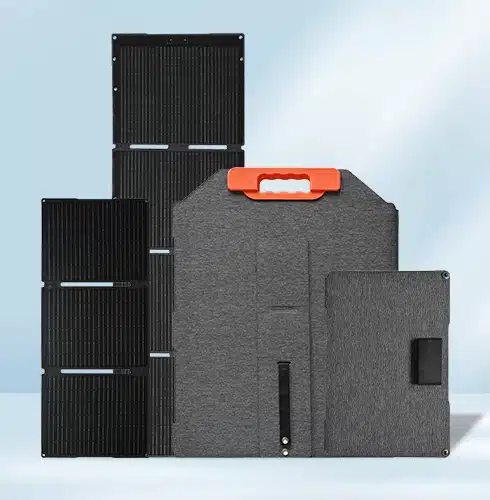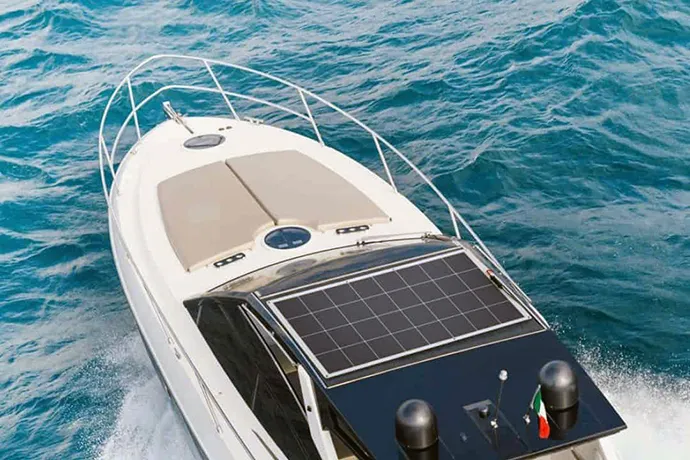As environmental awareness grows and sailors face increased energy needs during long voyages, solar panels have become an increasingly popular choice for boats. Selecting the right solar panels not only reduces your carbon footprint but also ensures a reliable and continuous energy supply while at sea.
This article will provide a detailed overview of three common types of solar panels for boats—portable, flexible, and rigid—to help boat owners make the best choice based on their specific needs.
Portable Solar Panels: A Lightweight and Flexible Option
Suitable Scenarios
Portable solar panels are ideal for short trips, marine camping, or recreational fishing. These panels provide a convenient energy solution for temporary, low-power needs on your boat.
Advantages
- Lightweight and Easy to Carry: Portable solar panels are light and easy to transport, making them perfect for short journeys.
- Integrated Features: Most portable solar panels come with built-in batteries and charge controllers, making them ideal for charging small devices like phones, cameras, and GPS units directly.
- Simple Installation: No complex installation process is needed—portable solar panels can be quickly set up and easily adjusted to maximize sunlight capture throughout the day.
Disadvantages
- Lower Power Output: Due to their size and weight limitations, portable solar panels typically cannot meet higher energy demands, making them unsuitable as a primary power source.
- Limited Battery Capacity: The built-in battery capacity is small, which limits their ability to meet continuous high-energy consumption needs, particularly during extended use.

Flexible Solar Panels: A Versatile Option for Varied Surfaces
Suitable Scenarios
Flexible solar panels are widely used on sailboats, motorboats, and yachts, especially on curved or irregular surfaces such as the boat’s deck or hull.
Advantages
- Flexible Installation: Flexible solar panels can conform to various curved surfaces, eliminating the need for complex mounting systems and simplifying installation.
- Lightweight Design: Compared to rigid solar panels, flexible panels are lighter, and less impacting the boat’s balance and stability—ideal for medium to small-sized boats.
- Easy Application: Many flexible solar panels feature peel-and-stick technology, requiring no special tools or technical expertise, allowing boat owners to install them themselves.
Disadvantages
- Lower Efficiency: Flexible solar panels generally have lower efficiency than rigid panels, requiring more surface area to generate the same amount of power.
- Durability Concerns: While suitable for most marine environments, flexible panels may not withstand extreme ocean conditions or rigid panels, which can lead to a shorter lifespan.
Rigid Solar Panels: High Efficiency and Durability for Professional Use
Suitable Scenarios
Rigid solar panels are the best choice for large yachts, commercial vessels, and boats that require a powerful, long-term, and reliable energy solution for offshore operations.
Advantages
- High Energy Conversion: Rigid solar panels offer the highest efficiency, producing maximum power output in a smaller installation footprint—perfect for boats with limited space.
- Robust and Durable: Designed for marine environments, rigid solar panels are built to withstand extreme conditions such as strong winds, high humidity, and salt spray, ensuring long-term use.
- Excellent Low-Light Performance: Rigid panels can generate power in low-light conditions such as overcast weather or early mornings, ensuring a consistent energy supply.
Disadvantages
- Heavier Weight: Rigid solar panels are heavier than flexible panels, requiring careful installation to avoid affecting the boat’s stability.
- Higher Initial Cost: The initial investment for rigid solar panels is higher, and the installation often requires professional assistance, adding to the overall cost.

Key Considerations When Choosing Solar Panel
Energy Needs Assessment
Before choosing solar panels, assess the energy needs of your boat. This includes the number of devices used daily, the total power output required, and the expected usage duration.
Boat Structure and Installation Space
Consider your boat’s structure and available installation space. If the boat has flat, sturdy surfaces, rigid solar panels are ideal. If curved surfaces need to be covered, flexible solar panels are more suitable.
Budget and Long-Term Costs
Initial budget and long-term maintenance costs are also important factors. While rigid solar panels have a higher upfront cost, their long lifespan and high efficiency can provide better value over time.
Frequently Asked Questions (FAQ)
Can portable solar panels charge the boat’s battery?
Portable solar panels can charge small batteries, but due to their lower power output, they are typically only suitable for powering small devices, not for continuously charging the main battery of the boat.
How do I maintain and clean flexible solar panels?
Maintaining flexible solar panels is simple—regularly clean the surface with warm water and a soft cloth, avoiding the use of corrosive cleaners to prevent damage to the panels.
What is the lifespan of rigid solar panels?
Rigid solar panels typically have a lifespan of over 20 years. With proper installation and maintenance, they can last even longer in marine environments.
Which type of solar panel performs best in cloudy or low-light conditions?
Rigid solar panels perform best in low-light conditions due to their high-efficiency cells, which maximize light utilization and generate relatively stable power even on cloudy days.
Can I install solar panels myself?
Portable and flexible solar panels can be installed by the boat owner. However, rigid solar panels require more complex mounting systems and stability considerations, so professional installation is recommended.
Do different types of solar panels require different controllers?
Yes, different types of solar panels may require different charge controllers to optimize charging efficiency and protect the battery system.












